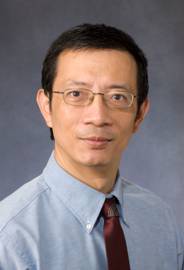 |
Prof. Zhong-Quan Zheng
Aerospace Engineering Department, University of Kansas, USA |
Abstract: Immersed-boundary (IB) methods typically discretize the governing equations on a Cartesian grid, and such methods generally do not require that the geometry of the boundary conform in any way to this Cartesian grid. Therefore, IB methods suit the computational needs for studying moving and/or morphing objects in fluid flow. Instead, the governing equations are augmented by an appropriately defined forcing term.
In this presentation, an improved direct-forcing method is introduced by discussing velocity interpolations on the immersed boundary, direct-forcing extrapolations to the grid points, resolution requirement of the immersed boundary points, internal layer treatment, and accuracy of the solution. Examples of applying this method and other related IB methods to reveal physical insights with moving and morphing objects are then presented.
About the Speaker: Dr. Zhongquan Zheng is currently Professor in Aerospace Engineering Department at University of Kansas, Fellow of ASME, and Associate Fellow of AIAA. Before he joined University of Kansas in 2010, he was a tenured Associate Professor in Mechanical and Nuclear Engineering Department at Kansas State University. He received his B.S. and M.S. degrees from Department of Engineering Mechanics at Shanghai Jiao Tong University in 1984 and 1987 respectively, and his Ph.D. degree in 1993 from Department of Mechanical Engineering and Mechanics, Old Dominion University. He was a faculty member in 1996-2001 in Mechanical Engineering Department at University of South Alabama, the Campus Director of Alabama Space Grant Consortium, and Director of Computational Mechanics Laboratory. Prior to that, he had conducted research for more than 8 years (including three years of Post-doctoral and five years of Ph.D. research) at NASA Langley Research Center. He has been a member of numerous TCs in ASME and AIAA, Vice Chair and then Chair of Computational Fluid Dynamics TC in ASME, and an Associate Editor of Journal of Fluids Engineering.
Date&Time: December 19, 2012 (Wednesday), 14:00–15:00
Location: 606 Conference Room


